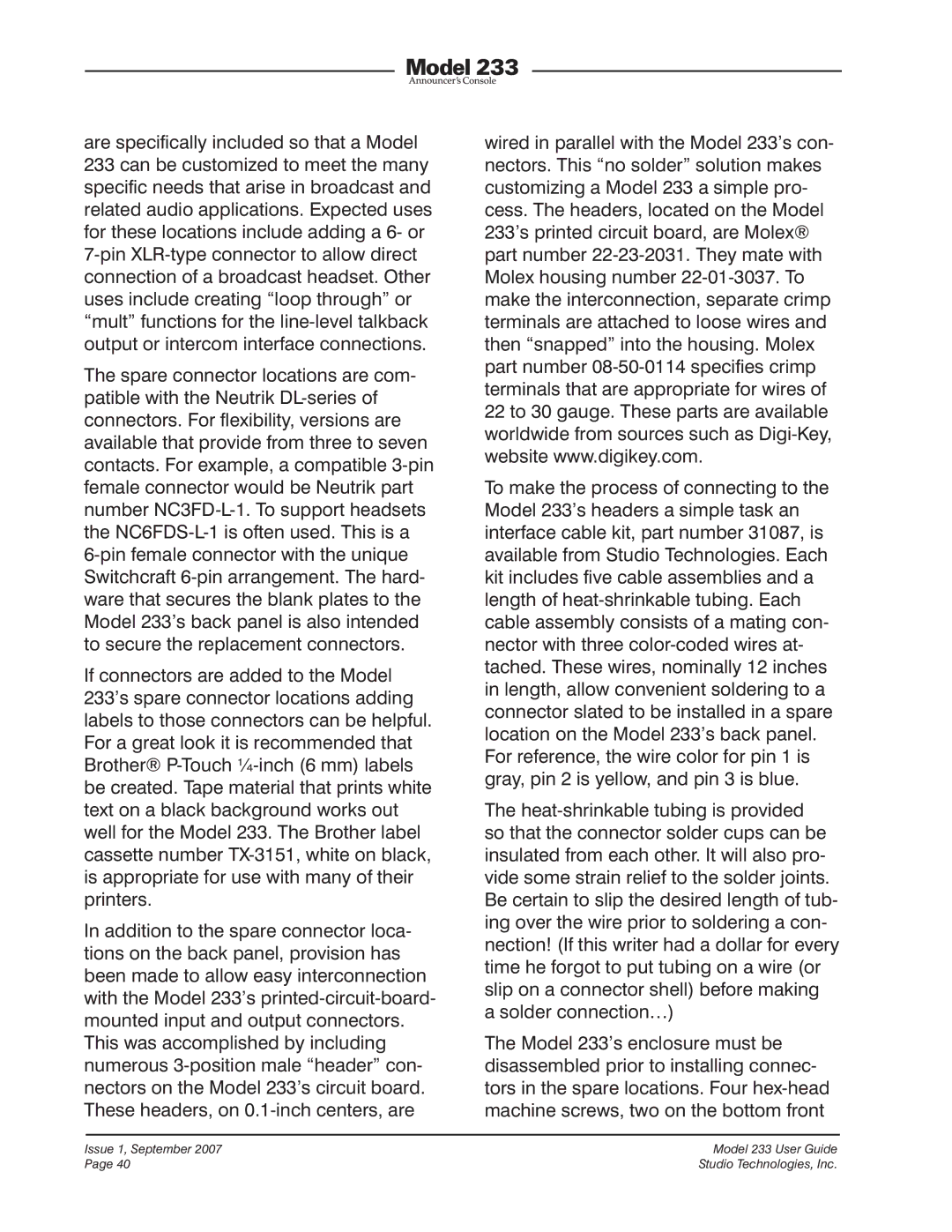are specifically included so that a Model 233 can be customized to meet the many specific needs that arise in broadcast and related audio applications. Expected uses for these locations include adding a 6- or 7-pin XLR-type connector to allow direct connection of a broadcast headset. Other uses include creating “loop through” or “mult” functions for the line-level talkback output or intercom interface connections.
The spare connector locations are com- patible with the Neutrik DL-series of connectors. For flexibility, versions are available that provide from three to seven contacts. For example, a compatible 3-pin female connector would be Neutrik part number NC3FD-L-1. To support headsets the NC6FDS-L-1 is often used. This is a 6-pin female connector with the unique Switchcraft 6-pin arrangement. The hard- ware that secures the blank plates to the Model 233’s back panel is also intended to secure the replacement connectors.
If connectors are added to the Model 233’s spare connector locations adding labels to those connectors can be helpful. For a great look it is recommended that Brother® P-Touch ¼-inch (6 mm) labels be created. Tape material that prints white text on a black background works out well for the Model 233. The Brother label cassette number TX-3151, white on black, is appropriate for use with many of their printers.
In addition to the spare connector loca- tions on the back panel, provision has been made to allow easy interconnection with the Model 233’s printed-circuit-board- mounted input and output connectors. This was accomplished by including numerous 3-position male “header” con- nectors on the Model 233’s circuit board. These headers, on 0.1-inch centers, are
wired in parallel with the Model 233’s con- nectors. This “no solder” solution makes customizing a Model 233 a simple pro- cess. The headers, located on the Model 233’s printed circuit board, are Molex® part number 22-23-2031. They mate with Molex housing number 22-01-3037. To make the interconnection, separate crimp terminals are attached to loose wires and then “snapped” into the housing. Molex part number 08-50-0114 specifies crimp terminals that are appropriate for wires of 22 to 30 gauge. These parts are available worldwide from sources such as Digi-Key, website www.digikey.com.
To make the process of connecting to the Model 233’s headers a simple task an interface cable kit, part number 31087, is available from Studio Technologies. Each kit includes five cable assemblies and a length of heat-shrinkable tubing. Each cable assembly consists of a mating con- nector with three color-coded wires at- tached. These wires, nominally 12 inches in length, allow convenient soldering to a connector slated to be installed in a spare location on the Model 233’s back panel. For reference, the wire color for pin 1 is gray, pin 2 is yellow, and pin 3 is blue.
The heat-shrinkable tubing is provided so that the connector solder cups can be insulated from each other. It will also pro- vide some strain relief to the solder joints. Be certain to slip the desired length of tub- ing over the wire prior to soldering a con- nection! (If this writer had a dollar for every time he forgot to put tubing on a wire (or slip on a connector shell) before making a solder connection…)
The Model 233’s enclosure must be disassembled prior to installing connec- tors in the spare locations. Four hex-head machine screws, two on the bottom front

